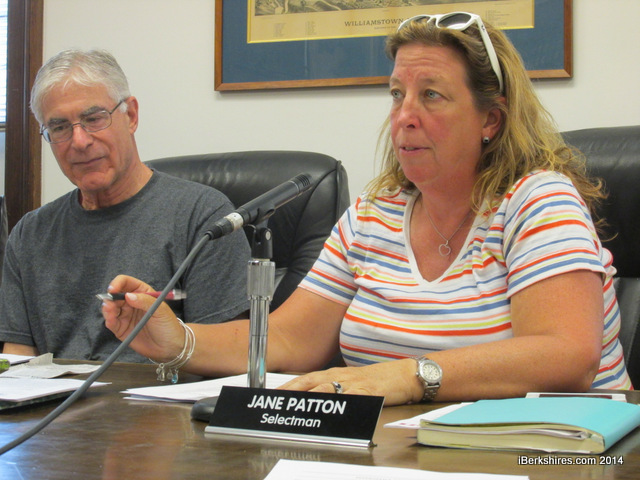 Big Elm Brewery's Jen Jaehnig, left, and the Williamstown Theatre Festival's Jennifer Crowell appear before the Williamstown Board of Selectmen on Monday. Big Elm Brewery's Jen Jaehnig, left, and the Williamstown Theatre Festival's Jennifer Crowell appear before the Williamstown Board of Selectmen on Monday. |
WILLIAMSTOWN, Mass. — The Board of Selectmen on Monday put the finishing touches on a senior tax work-off program authorized by town meeting last month.
In the program's first year, the town will offer three positions that will be eligible for a $1,000 credit on property taxes. The positions are slotted in three of the town's service centers: the elementary school, the senior center and the public library.
The board agreed with the town manager's argument that the tax work-off program not be a "make work" program.
"We think our most fertile ground is to attract new skills for new ventures we haven't thought of," Town Manager Peter Fohlin said on Monday. "Maybe there's someone out there who would teach oil painting at the senior center."
The board made one modification to Fohlin's original draft of the program guidelines. Originally, he made no reference to residency; participants only would have needed to be property owners over age 60.
But the board voted to add a requirement that participants live in the town for six months and one day each year.
It also revisited the issue of whether to create some sort of financial requirement to keep the program targeted to those most in need of tax relief.
When Fohlin introduced the plan at the board's June 9 meeting, he told the panel he was not interested in having Town Hall look at residents' federal income tax returns or some other mechanism to determine income eligibility.
But members of the board that night — and again on Monday — pitched the idea of making the program eligible only to residents whose property value is at or below a designated limit. For argument's sake, the board worked with the number $200,000.
Board Chairman Ronald Turbin asked Fohlin at one point if he would be comfortable using property value as a "tie-breaker" between two competing applicants with similar skill sets, and Fohlin said he would not.
"If two people present themselves and one has a house worth $200,000 and one has a house worth $300,000, that tells me nothing about their needs," he said. "If you want to set a threshold, then you as policymakers are making an assumption that property value says something. I can live with that because it's policy."
Selectwoman Jane Patton steered the board away from creating such a policy.
"At some point, doesn't it seem like we're seriously overcomplicating this and overthinking this?" she asked rhetorically. "We're talking about starting a program that helps folks over 60 who have something to offer the community. And for that service, we're suggesting a $1,000 abatement and a cap of $3,000 [for the entire program].
"We may not have anybody apply, or we might have 50 people apply. I feel like we're massively overthinking this ... speculating someone might game the system."
Patton also pointed out that a resident could hold title to an expensive home but be cash poor — making him or her just the sort of resident the program is intended to serve.
The main business of Monday's meeting was approval of a $2.6 million grant to help fund the Highland Woods senior housing project.
But the board also approved a couple of one-day alcohol licenses in its capacity as the town's alcohol licensing authority, approved several appointments to town committees and continued its discussion of economic development.
Sheffield's Big Elm Brewery was given approval to pour at a Williamstown Theatre Festival family concert event at Cricket Creek Farm on Sunday, Aug. 10, from 3:30 to 7:45 p.m. The board required the vendor to use a wrist band system to control who is eligible to purchase alcohol and to set a two-drink maximum per purchase.
The board also OK'd three Williams College events at Field Farm on the evenings of July 13, Aug. 10 and Sept. 14.
The BOS made the following appointments to town commissions and committees: Philip McKnight and Richard Schlesinger to the Conservation Commission; William Barkin to the Historical Commission; Dylan Stafford, Leigh Short and Van Ellet to the Affordable Housing Committee; and William Galusha to the Agricultural Commission.
The current chairs of the last two bodies appeared on Monday to update the selectmen on their panels' activities.
Ellet said the Affordable Housing Committee is regrouping in the wake of this spring's resignations of three long-standing committee members. The now four-person committee (Craig Clemow is the fourth) met last week to discuss its future priorities.
"We are pleased about all the housing in the works and coming online ... but very much committed to the fact that the job is not done," Ellet said.
Among the projects on the committee's agenda are calculating the future need for subsidized housing in the town and developing a long-range plan to meet that need. Selectman Andrew Hogeland encouraged Ellet to coordinate his committee's work with that of the Planning Board, which has authorship of the town's Master Plan.
Ag Commission Chairwoman Beth Phelps explained her committee's efforts to promote local agriculture and preserve farming opportunities. She told the BOS about a recent dispute the commission mediated between the Galusha family and the Massachusetts Division of Fisheries and Wildlife over the cultivation of a parcel in South Williamstown.
Phelps said the commission convinced the commonwealth to give the farm a one-year reprieve from an order to stop working the land, but the commission is looking at how use of the "prime ag land" can be continued.
Selectmen Hogeland and Hugh Daley brought their colleagues up to speed on the research they have done around the topic of economic development.
Hogeland said he sat down with North Adams planner Mackenzie Greer to pick her brain about lessons the city learned in its economic development effort. He came away with a sense that Williamstown may need to engage a consultant at some point and an increased sense that the town should be coordinating its efforts with other municipalities in the region.
Daley said the survey of Chamber of Commerce members that the board has discussed may have to wait until the fall, since the chamber does not hold regular meetings again until September. He also said Chamber Executive Director Jennifer Civello recommended an online survey might work best.
Daley also brought up the potential of fully implementing the Mass Broadband Initiative in town to bring higher-speed and greater capacity to potential businesses that may want to locate in the Village Beautiful.
"We have to make sure we do it correctly," he said, noting that it would cost money to bring the service to town. "I don't know if there are federal matching grants or whatever. ... The only thing harder than finding businesses to move here might be finding money to get businesses to move here.
"It is an open question whether our economy is not expanding due to an infrastructure deficiency. In the olden days, it would have been like having the telegraph lines or not having the telegraph lines. The question is whether adequate service gets us over the hurdles with most people."

 Big Elm Brewery's Jen Jaehnig, left, and the Williamstown Theatre Festival's Jennifer Crowell appear before the Williamstown Board of Selectmen on Monday.
Big Elm Brewery's Jen Jaehnig, left, and the Williamstown Theatre Festival's Jennifer Crowell appear before the Williamstown Board of Selectmen on Monday.
 WILLIAMSTOWN, Mass. — The Prudential Committee on Wednesday signed off on more than $1 million in cost cutting measures for the planned Main Street fire station.
WILLIAMSTOWN, Mass. — The Prudential Committee on Wednesday signed off on more than $1 million in cost cutting measures for the planned Main Street fire station.













